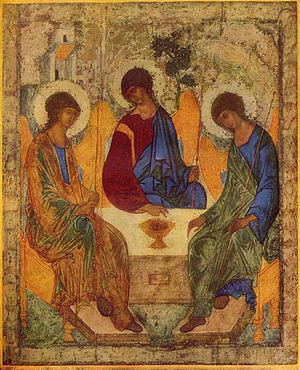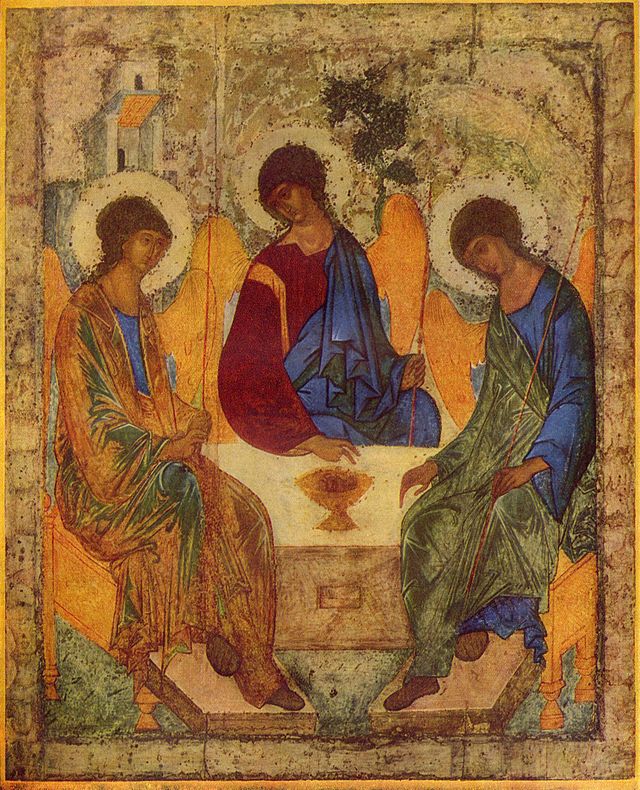The sad discrepancy between the God that we're supposed to worship, and the idols we actually venerate.
Showing posts with label Jesus Christ - Trinity. Show all posts
Showing posts with label Jesus Christ - Trinity. Show all posts
Tuesday, June 25, 2013
The Holy Trinity
The sad discrepancy between the God that we're supposed to worship, and the idols we actually venerate.
Labels:
Church Calendar
,
Jesus Christ - Trinity
,
SPIRITUAL STRUGGLE
Tuesday, June 21, 2011
On the Holy Spirit
Why isn't He simply called Spirit, for instance?
Or why aren't then the first two called Holy Father and Holy Son as well?
Because the Spirit (breath, respiration) is the element of life, and, if sin and death are umbilically connected (Romans 5:12), then the same can be said about life and holiness as well.
Labels:
APOLOGETICS
,
Church Calendar
,
Jesus Christ - Trinity
,
SPIRITUAL STRUGGLE
Monday, June 20, 2011
Thursday, June 16, 2011
The Sin Against the Holy Spirit
Labels:
APOLOGETICS
,
Church Calendar
,
Jesus Christ - Trinity
,
Roman Catholicism
,
Sacraments
Wednesday, June 15, 2011
The Blasphemy Against the Holy Ghost
Labels:
APOLOGETICS
,
Church Calendar
,
Jesus Christ - Trinity
,
Roman Catholicism
Tuesday, June 14, 2011
Why the Son and the Spirit Are Not the Same Person
Labels:
APOLOGETICS
,
Church Calendar
,
Jesus Christ - Trinity
Monday, June 13, 2011
On the Personhood of the Holy Spirit
Labels:
APOLOGETICS
,
Church Calendar
,
Jesus Christ - Trinity
Sunday, June 12, 2011
Talmudic Trinity

"I was looking down until chairs were set down, and the Ancient of days seated himself" (Daniel 7:9)
"The chairs": Why are they in plural? One for Him and one for David. So Rabbi Aqiba in a Boraitha.
Said Rabbi Elazar ben Azaryah to him: "Aqiba, how do you dare to make the Shekhina common? It means one chair for judgment and one for mercy".
Did Aqiba accept this, or not? Come and hear the following Boraitha: "One for judgment and one for mercy". So Rabbi Aqiba.
Said Rabbi Elazar ben Azaryah to him: "Aqiba, what hast thou to do with Haggada? It means one for a chair to sit upon and one for a footstool".
Babylonian Talmud, Tract Sanhedrin, Haggadah
Is it only me, or does the imagery of God standing between His enthroned attributes of Justice and Mercy not help his case?...
As for the two thrones being one for sitting down and one for resting one's feet upon, then -according to the Holy Prophet Isaiah- these are Heaven and earth: which would support the Incarnation, especially in the light of Psalms 99:5 and 132:7, where His footstool, the earth (from which Man / Adam was taken), is being worshipped.
As for the second throne belonging to King David, whose son was the Messiah supposed to be?
Labels:
APOLOGETICS
,
Church Calendar
,
Jesus Christ - Trinity
,
Jewish Roots
Sunday, January 23, 2011
The Monarchy of the Father
...because no one can better express the Trinitarian view of the fourth century Eastern Orthodox Nicene and Cappadocian Fathers than a 21st century Western tongue-talking Charismatic-Pentecostal!
Labels:
APOLOGETICS
,
External
,
Jesus Christ - Trinity
,
Roman Catholicism
Wednesday, October 20, 2010
The Lord Created Me, The Beginning Of His Ways
The Lord created Me, the Beginning of His ways, before His works of old.
From everlasting was I founded, from the beginning, ere than the earth was made.
There were no depths when I was born, nor any springs laden with water.
Before the mountains' foundations were established, before the hills were formed, was I begotten.
Before Abraham was, I am.
From everlasting was I founded, from the beginning, ere than the earth was made.
There were no depths when I was born, nor any springs laden with water.
Before the mountains' foundations were established, before the hills were formed, was I begotten.
Before Abraham was, I am.
Labels:
APOLOGETICS
,
Jesus Christ - Trinity
Friday, September 24, 2010
The Jewish Trinity

The one in the middle is the Father of the Universe, who in the Sacred Scriptures is called by his proper name, I am that I am ; and the Beings on each side are those most ancient Powers which are always close to the living God, one of which is called his Creative Power, and the other his Royal Power. And the Creative Power is God, for it is by this that he made and arranged the Universe; and the Royal Power is the Lord, for it is fitting that the Creator should lord it over and govern the creature.
Philo of Alexandria, On Abraham,
chapter 24, paragraph 121.
chapter 24, paragraph 121.
Labels:
APOLOGETICS
,
Jesus Christ - Trinity
,
Jewish Roots
Friday, September 3, 2010
Islamic Double Standards
On one hand, we loved Christ so much that we began worshipping Him as a God 1; on the other hand, we make up all these fancifully-imaginary stories about Him partaking of a shameful and painful death, by crucifixion, being abused, beaten, cursed, flogged, hurt, insulted, laughed at, mocked, punched, ridiculed, scorned, scourged, slapped, smitten, spat upon, tortured, and finally exposed naked on the rough wood of a Cross, for anyone to look upon Him with disgust, and consider Him as accursed by God Himself! 2
On one hand, Islam denies Christ's divinity; on the other hand, its teaching about the Crucifixion being an illusion was adopted from Docetism, an early Gnostic sect, whose Christology is diametrically-opposed to that of Muslims, considering Jesus to have been solely-divine, possessing only a spiritual body -- and since disincarnate beings like gods, ghosts, and spirits can't die...
1 itself a question-begging double-standard, since early Christians abhorred the idea of deifying men, no matter how holy or high-up they were -- so why make an exception for Christ?
2 Deuteronomy 21:23; Galatians 3:13.
Labels:
APOLOGETICS
,
Islam
,
Jesus Christ - Trinity
Friday, May 21, 2010
The Fallacy Of Believing That Jesus Was A Mere Man, Later Deified By His Followers
Acts 10:25 And as Peter was coming in, Cornelius met him, and fell down at his feet, and worshipped him. 26 But Peter took him up, saying, Stand up; I myself also am a man.
Acts 12:21 And upon a set day Herod, arrayed in royal apparel, sat upon his throne, and made an oration unto them. 22 And the people gave a shout, saying, It is the voice of a god, and not of a man. 23 And immediately the angel of the Lord smote him, because he gave not God the glory: and he was eaten of worms, and gave up the ghost.
Acts 14:11 And when the people saw what Paul had done, they lifted up their voices, saying in the speech of Lycaonia, The gods are come down to us in the likeness of men. 12 And they called Barnabas, Jupiter; and Paul, Mercurius, because he was the chief speaker. 13 Then the priest of Jupiter, which was before their city, brought oxen and garlands unto the gates, and would have done sacrifice with the people. 14 Which when the apostles, Barnabas and Paul, heard of, they rent their clothes, and ran in among the people, crying out, 15 And saying, Sirs, why do ye these things? We also are men of like passions with you, and preach unto you that ye should turn from these vanities unto the living God, which made heaven, and earth, and the sea, and all things that are therein: 16 Who in times past suffered all nations to walk in their own ways. 17 Nevertheless he left not himself without witness, in that he did good, and gave us rain from heaven, and fruitful seasons, filling our hearts with food and gladness. 18 And with these sayings scarce restrained they the people, that they had not done sacrifice unto them.
Romans 1:21 Because that, when they knew God, they glorified him not as God, neither were thankful; but became vain in their imaginations, and their foolish heart was darkened. 23 And changed the glory of the uncorruptible God into an image made like to corruptible man, and to birds, and fourfooted beasts, and creeping things. 25 Who changed the truth of God into a lie, and worshipped and served the creature more than the Creator, who is blessed for ever. Amen.
Labels:
APOLOGETICS
,
Islam
,
Jesus Christ - Trinity
Monday, May 10, 2010
Reformed Protestant Double Standard
Philip Schaff
History of the Christian Church, Third Volume
Chapter IX. Theological Controversies,
And Development Of The Ecumenical Orthodoxy.
§ 142. The Orthodox Christology: Analysis and Criticism.
Such considerations suggest the true position and the just value of the Creed of Chalcedon, against both exaggeration and disparagement. That symbol does not aspire to comprehend the Christological mystery, but contents itself with setting forth the facts and establishing the boundaries of orthodox doctrine. It does not mean to preclude further theological discussion, but to guard against such erroneous conceptions as would mutilate either the divine or the human in Christ, or would place the two in a false relation. It is a light-house, to point out to the ship of Christological speculation the channel between Scylla and Charybdis, and to save it from stranding upon the reefs of Nestorian dyophysitism or of Eutychian monophysitism. It contents itself with settling, in clear outlines, the eternal result of the theanthropic process of incarnation, leaving the study of the process itself to scientific theology. The dogmatic letter of Leo, it is true, takes a step beyond this, towards a theological interpretation of the doctrine; but for this very reason it cannot have the same binding and normative force as the symbol itself. As the Nicene doctrine of the Trinity stands midway between tritheism and Sabellianism, so the Chalcedonian formula strikes the true mean between Nestorianism and Eutychianism. It accepts dyophysitism; and so far it unquestionably favored and satisfied the moderate Antiochian party rather than the Egyptian. But at the same time it teaches with equal distinctness, in opposition to consistent Nestorianism, the inseparable unity of the person of Christ.
§ 159. Semi-Pelagianism.
Semi-Pelagianism is a somewhat vague and indefinite attempt at reconciliation, hovering midway between the sharply marked systems of Pelagius and Augustine, taking off the edge of each, and inclining now to the one, now to the other. The name was introduced during the scholastic age, but the system of doctrine, in all essential points, was formed in Southern France in the fifth century, during the latter years of Augustine’s life and soon after his death. It proceeded from the combined influence of the pre-Augustinian synergism and monastic legalism. Its leading idea is, that divine grace and the human will jointly accomplish the work of conversion and sanctification, and that ordinarily man must take the first step. It rejects the Pelagian doctrine of the moral roundness of man, but rejects also the Augustinian doctrine of the entire corruption and bondage of the natural man, and substitutes the idea of a diseased or crippled state of the voluntary power. It disowns the Pelagian conception of grace as a mere external auxiliary; but also, quite as decidedly, the Augustinian doctrines of the sovereignty, irresistibleness, and limitation of grace; and affirms the necessity and the internal operation of grace with and through human agency, a general atonement through Christ, and a predestination to salvation conditioned by the foreknowledge of faith. The union of the Pelagian and Augustinian elements thus attempted is not, however, an inward organic coalescence, but rather a mechanical and arbitrary combination, which really satisfies neither the one interest nor the other, but commonly leans to the Pelagian side.
Subscribe to:
Posts
(
Atom
)


